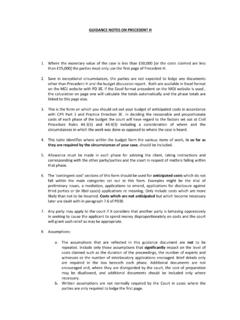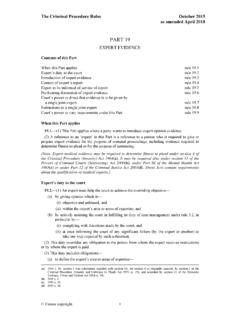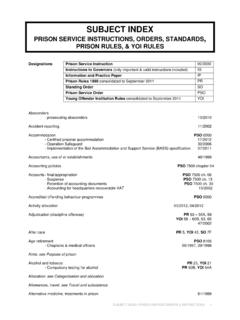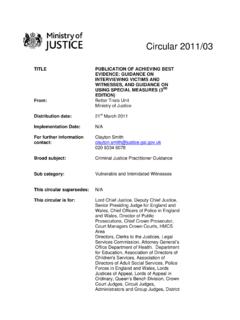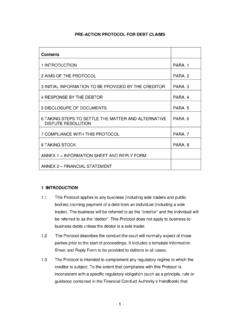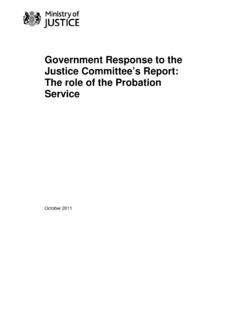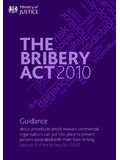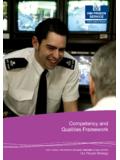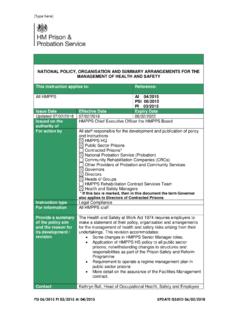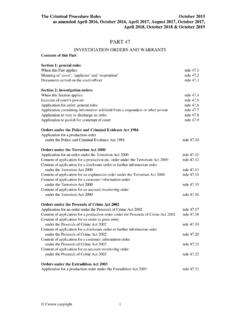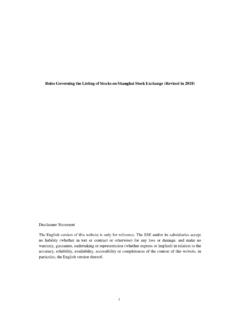Transcription of PART 23 - Justice.gov.uk
1 The Criminal Procedure Rules October 2015 as amended April 2018 Crown copyright 1 part 23 RESTRICTION ON cross -EXAMINATION BY A DEFENDANT Contents of this part General rules When this part applies rule of advocate to cross -examine witnessrule Application to prohibit cross -examination Exercise of court s powers rule to prohibit cross -examinationrule to discharge prohibition imposed by the courtrule containing information withheld from another partyrule in response rule s power to vary requirements rule GENERAL RULES When this part applies This part applies where (a) a defendant may not cross -examine in person a witness because of section 34 or section 35 of the Youth Justice and Criminal Evidence Act 1999(a) (Complainants in proceedings for sexual offences; Child complainants and other child witnesses); (b) the court can prohibit a defendant from cross -examining in person a witness under section 36 of that Act(b) (Direction prohibiting accused from cross -examining particular witness).
2 [Note. Under section 34 of the Youth Justice and Criminal Evidence Act 1999, no defendant charged with a sexual offence may cross -examine in person a witness who is the complainant, either (a) in connection with that offence; or (b) in connection with any other offence (of whatever nature) with which that defendant is charged in the proceedings. Under section 35 of the 1999 Act, no defendant charged with an offence listed in that section may cross -examine in person a protected witness, either (a) in connection with that offence; or (b) in connection with any other offence (of whatever nature) with which that defendant is charged in the proceedings. A protected witness is one who (a) either is the complainant or is alleged to have been a witness to the commission of the offence; and (a) 1999 c.]
3 23; section 35 was amended by sections 139 and 140 of, and paragraph 41 of Schedule 6 and Schedule 7 to, the Sexual Offences Act 2003 (c. 42), section 148 of, and paragraphs 35 and 36 of Schedule 26 to, the Criminal Justice and Immigration Act 2008 (c. 4) and section 105 of the Coroners and Justice Act 2009 (c. 25). (b) 1999 c. 23. The Criminal Procedure Rules October 2015 as amended April 2018 Crown copyright 2(b) either is a child, within the meaning of section 35, or is due to be cross -examined after giving evidence in chief (i) by means of a video recording made when the witness was a child, or (ii) in any other way when the witness was a child. Under section 36 of the 1999 Act, where neither section 34 nor section 35 applies the court may give a direction prohibiting the defendant from cross -examining, or further cross -examining, in person a witness, on application by the prosecutor or on the court s own initiative.
4 See also rules to ] Appointment of advocate to cross -examine witness (1) This rule applies where a defendant may not cross -examine in person a witness in consequence of (a) the prohibition imposed by section 34 or section 35 of the Youth Justice and Criminal Evidence Act 1999; or (b) a prohibition imposed by the court under section 36 of the 1999 Act. (2) The court must, as soon as practicable, explain in terms the defendant can understand (with help, if necessary) (a) the prohibition and its effect; (b) that if the defendant will not be represented by a lawyer with a right of audience in the court for the purposes of the case then the defendant is entitled to arrange for such a lawyer to cross -examine the witness on his or her behalf; (c) that the defendant must notify the court officer of the identity of any such lawyer, with details of how to contact that person, by no later than a date set by the court.
5 (d) that if the defendant does not want to make such arrangements, or if the defendant gives no such notice by that date, then (i) the court must decide whether it is necessary in the interests of justice to appoint such a lawyer to cross -examine the witness in the defendant s interests, and (ii) if the court decides that that is necessary, the court will appoint a lawyer chosen by the court who will not be responsible to the defendant. (3) Having given those explanations, the court must (a) ask whether the defendant wants to arrange for a lawyer to cross -examine the witness, and set a date by when the defendant must notify the court officer of the identity of that lawyer if the answer to that question is yes ; (b) if the answer to that question is no , or if by the date set the defendant has given no such notice (i) decide whether it is necessary in the interests of justice for the witness to be cross -examined by an advocate appointed to represent the defendant s interests, and (ii) if the court decides that that is necessary, give directions for the appointment of such an advocate.
6 (4) The court may give the explanations and ask the questions required by this rule (a) at a hearing, in public or in private; or (b) without a hearing, by written notice to the defendant. (5) The court may extend (even after it has expired) the time limit that it sets under paragraph (3)(a) (a) on application by the defendant; or (b) on its own initiative. (6) Paragraphs (7), (8), (9) and (10) apply where the court appoints an advocate. The Criminal Procedure Rules October 2015 as amended April 2018 Crown copyright 3(7) The directions that the court gives under paragraph (3)(b)(ii) must provide for the supply to the advocate of a copy of (a) all material served by one party on the other, whether before or after the advocate s appointment, to which applies (i) part 8 (Initial details of the prosecution case), (ii) in the Crown Court, rule (service of prosecution evidence in a case sent for trial), (iii) part 16 (Written witness statements), (iv) part 19 (Expert evidence), (v) part 20 (Hearsay evidence), (vi) part 21 (Evidence of bad character), (vii) part 22 (Evidence of a complainant s previous sexual behaviour).
7 (b) any material disclosed, given or served, whether before or after the advocate s appointment, which is (i) prosecution material disclosed to the defendant under section 3 (Initial duty of prosecutor to disclose) or section 7A (Continuing duty of prosecutor to disclose) of the Criminal Procedure and Investigations Act 1996(a), (ii) a defence statement given by the defendant under section 5 (Compulsory disclosure by accused) or section 6 (Voluntary disclosure by accused) of the 1996 Act(b), (iii) a defence witness notice given by the defendant under section 6C of that Act(c) (Notification of intention to call defence witnesses), or (iv) an application by the defendant under section 8 of that Act(d) (Application by accused for disclosure); (c) any case management questionnaire prepared for the purposes of the trial or, as the case may be, the appeal; and (d) all case management directions given by the court for the purposes of the trial or the appeal.
8 (8) Where the defendant has given a defence statement (a) section 8(2) of the Criminal Procedure and Investigations Act 1996 is modified to allow the advocate, as well as the defendant, to apply for an order for prosecution disclosure under that subsection if the advocate has reasonable cause to believe that there is prosecution material concerning the witness which is required by section 7A of the Act to be disclosed to the defendant and has not been; and (b) rule (Defendant s application for prosecution disclosure) applies to an application by the advocate as it does to an application by the defendant. (9) Before receiving evidence the court must establish, with the active assistance of the parties and of the advocate, and in the absence of any jury in the Crown Court (a) 1996 c.
9 25; section 3 was amended by section 82 of, and paragraph 7 of Schedule 4 to, the Regulation of Investigatory Powers Act 2000 (c. 23) and section 32 of, and paragraphs 20 and 21 of Schedule 36 to, the Criminal Justice Act 2003 (c. 44). It is further amended by section 271 of, and paragraph 39 of Schedule 10 to, the Investigatory Powers Act 2016 (c. 25), with effect from a date to be appointed. Section 7A was inserted by section 37 of the Criminal Justice Act 2003 (c. 44). It, too, is amended by section 271 of, and paragraph 39 of Schedule 10 to, the Investigatory Powers Act 2016 (c. 25), with effect from a date to be appointed. (b) 1996 c. 25; section 5 was amended by section 119 of, and paragraph 126 of Schedule 8 to, the Crime and Disorder Act 1998 (c. 37), in respect of certain proceedings only, and by section 33 of, and paragraph 66 of Schedule 3, paragraphs 20 and 23 of Schedule 36 and Parts 3 and 4 of Schedule 37 to, the Criminal Justice Act 2003 (c.)
10 44). Section 6 was amended by paragraphs 20 and 24 of Schedule 36 and part 3 of Schedule 37 to the Criminal Justice Act 2003 (c. 44).) For transitional provisions and savings see paragraph (2) of Schedule 2 to 2005/950. (c) 1996 c. 25; section 6C was inserted by section 34 of the Criminal Justice Act 2003 (c. 44). (d) 1996 c. 25; section 8 was amended by section 82 of, and paragraph 7 of Schedule 4 to, the Regulation of Investigatory Powers Act 2000 (c. 23) and section 38 of the Criminal Justice Act 2003 (c. 44). It is further amended by section 271 of, and paragraph 39 of Schedule 10 to, the Investigatory Powers Act 2016 (c. 25), with effect from a date to be appointed. The Criminal Procedure Rules October 2015 as amended April 2018 Crown copyright 4(a) what issues will be the subject of the advocate s cross -examination; and (b) whether the court s permission is required for any proposed question, for example where part 21 or part 22 applies.
